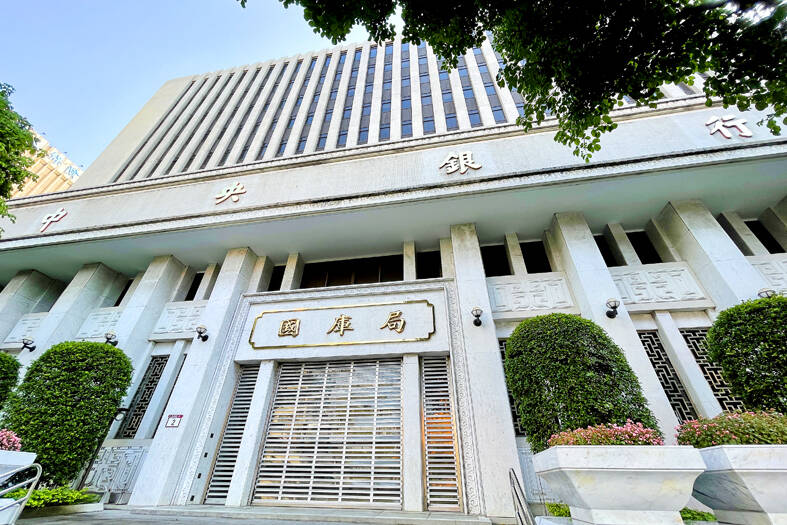The central bank yesterday asked domestic lenders to come up with self-disciplinary measures by Sept. 6 to limit mortgage operations to prevent an overconcentration of real-estate loans.
The monetary policymaker made the request after meetings with 34 local lenders and cooperative banks to gain a better understanding of the housing market, said Alan Pan (潘榮耀), director general of the central bank’s banking department.
The central bank called on all lenders to submit quantitative control measures on their own to cool mortgage operations as “all agreed the housing market is heating up,” Pan told an online news conference yesterday.

Photo: George Tsorng, Taipei Times
As of June 30, real-estate lending accounted for 37.4 percent of the banking system’s loans, close to the record of 37.9 percent, Pan said.
He called for greater diversification and suggested that it would be safer to keep the ratio at 35 percent to 36 percent to avoid credit crunches for other business sectors.
House loans and prices showed signs of moderation between June 2020 and June last year following waves of selective credit controls and unfavorable policy measures, the central bank said.
However, housing fever surged again in the second half of last year following the government’s introduction of favorable lending terms for first-home buyers, including interest subsidies, a five-year grace period and mortgages of 40 years, the central bank said.
An overconcentration of credit in real estate threatens the stability of the financial system and would hinder the growth of other sectors, it said.
All banks should exercise caution and move to prevent money from overflowing to the property market to help to curb speculation and land hoarding, practices that would spur unreasonable price hikes, Pan said.
Banks should apply their own quantitative control measures without affecting loans intended for urban renewal projects, first-home purchases and relocations, he said.
The central bank would launch inspections to make sure lenders follow through with their own control measures, he added.
Further, the central bank would continue to monitor the housing market and introduce more credit controls, if necessary, to maintain the health of the financial system. The bank is due to review its monetary policy on Sept. 19.
In a related development, the Ministry of Finance yesterday said that a second wave of inspections found 73 more cases of fraudulent buyers and misuses of the favorable lending terms.
The inspections led to a crackdown on 39 fraudulent buyers and 34 mortgagers who leased out their apartments, the ministry said.

Semiconductor business between Taiwan and the US is a “win-win” model for both sides given the high level of complementarity, the government said yesterday responding to tariff threats from US President Donald Trump. Home to the world’s largest contract chipmaker, Taiwan Semiconductor Manufacturing Co (TSMC, 台積電), Taiwan is a key link in the global technology supply chain for companies such as Apple Inc and Nvidia Corp. Trump said on Monday he plans to impose tariffs on imported chips, pharmaceuticals and steel in an effort to get the producers to make them in the US. “Taiwan and the US semiconductor and other technology industries

A start-up in Mexico is trying to help get a handle on one coastal city’s plastic waste problem by converting it into gasoline, diesel and other fuels. With less than 10 percent of the world’s plastics being recycled, Petgas’ idea is that rather than letting discarded plastic become waste, it can become productive again as fuel. Petgas developed a machine in the port city of Boca del Rio that uses pyrolysis, a thermodynamic process that heats plastics in the absence of oxygen, breaking it down to produce gasoline, diesel, kerosene, paraffin and coke. Petgas chief technology officer Carlos Parraguirre Diaz said that in

SMALL AND EFFICIENT: The Chinese AI app’s initial success has spurred worries in the US that its tech giants’ massive AI spending needs re-evaluation, a market strategist said Chinese artificial intelligence (AI) start-up DeepSeek’s (深度求索) eponymous AI assistant rocketed to the top of Apple Inc’s iPhone download charts, stirring doubts in Silicon Valley about the strength of the US’ technological dominance. The app’s underlying AI model is widely seen as competitive with OpenAI and Meta Platforms Inc’s latest. Its claim that it cost much less to train and develop triggered share moves across Asia’s supply chain. Chinese tech firms linked to DeepSeek, such as Iflytek Co (科大訊飛), surged yesterday, while chipmaking tool makers like Advantest Corp slumped on the potential threat to demand for Nvidia Corp’s AI accelerators. US stock

SUBSIDIES: The nominee for commerce secretary indicated the Trump administration wants to put its stamp on the plan, but not unravel it entirely US President Donald Trump’s pick to lead the agency in charge of a US$52 billion semiconductor subsidy program declined to give it unqualified support, raising questions about the disbursement of funds to companies like Intel Corp and Taiwan Semiconductor Manufacturing Co (台積電). “I can’t say that I can honor something I haven’t read,” Howard Lutnick, Trump’s nominee for commerce secretary, said of the binding CHIPS and Science Act awards in a confirmation hearing on Wednesday. “To the extent monies have been disbursed, I would commit to rigorously enforcing documents that have been signed by those companies to make sure we get